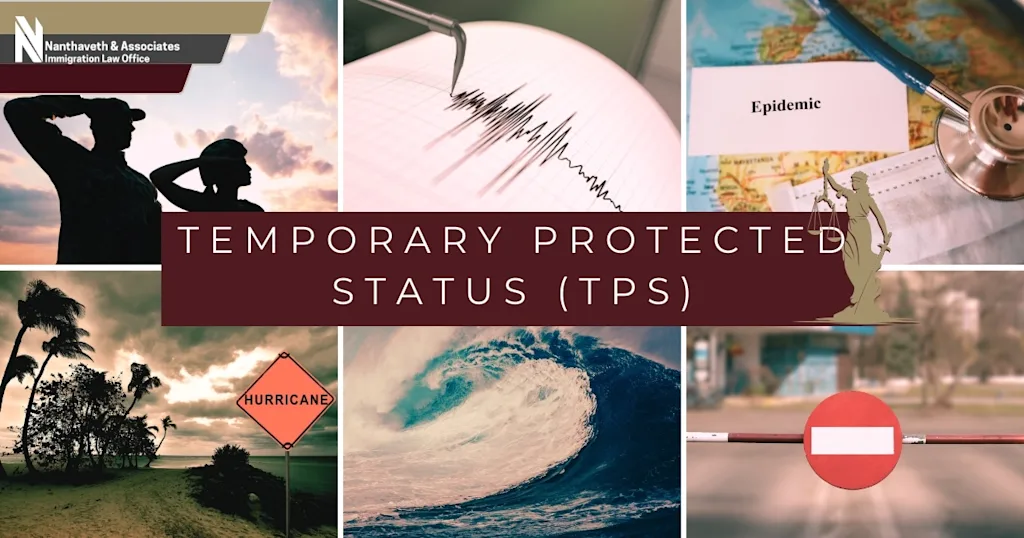Temporary Protected Status
Temporary Protected Status (TPS) is a designation for people who are in the United States and can’t immediately return home safely due to a widespread, temporary condition in their nation. If a set of circumstances or conditions makes a country unsafe to return to, the Secretary of Homeland Security can designate the country for this purpose.
Once a country has been designated by Homeland Security as a TPS nation, U.S. Citizenship and Immigration Services (USCIS) can then grant TPS status to eligible people from those nations who are in the United States. Consider that it would be unethical to force someone to return to a war zone, the site of a huge natural disaster, or a nation experiencing a humanitarian crisis. That’s why the Temporary Protected Status designation exists.

Reasons a Country is Made Eligible For TPS Participation
There are several reasons why the Secretary of Homeland Security might feel that it’s unsafe for people to return to their home nations. Those include the following:
- Ongoing armed conflict
- Earthquake
- Epidemic
- Hurricane
- Tsunami
- Other extraordinary and temporary conditions
What Happens When a Country Is Eligible for TPS?
If you are in the United States when your home country was designated for TPS, you may be eligible to apply for Temporary Protected Status. If TPS is approved, you’ll be granted certain benefits. Those include:
- You cannot be removed from the United States
- You can apply for an employment authorization document
- You can be granted authorization to travel
- You can’t be detained by DHS based on your immigration status
It’s important to realize that TPS is a temporary benefit only. TPS does not lead to an eventual green card. That said, having Temporary Protected Status doesn’t make you ineligible for applying for a nonimmigrant visa, filing an adjustment of status if you’ve previously been “inspected and admitted” to the US., or applying for other immigration benefits or protections that you are otherwise considered eligible. TPS is a stand-alone designation. It doesn’t affect any other applications or petitions. Likewise, other petitions and applications you might have already filed don’t affect your chance of getting TPS either.
Countries Currently Designated for TPS
As of December 2023, the following countries are designated for TPS, but these are subject to change. You can find an updated list at any time on the TPS webpage maintained by USCIS.
- Afghanistan
- Burma (Myanmar)
- Cameroon
- El Salvador
- Ethiopia
- Haiti
- Honduras
- Nepal
- Syria
- Ukraine
- Venezuela
- Yemen
- Nicaragua
- Somalia
- South Sudan
- Sudan
Other TPS Eligibility Requirements
To be eligible for Temporary Protected Status, you must meet all the following circumstances:
- Be a national of one of the countries designated for TPS or a person without nationality who most recently lived in one of the countries designated for TPS.
- File for TPS during the open initial registration or re-registration period or be eligible for late initial filing.
- Have been continuously physically present in the U.S. since the effective date of the most recent designation date listed for the country you came from.
- Have been continuously residing (CR) in the U.S. since the date specified for the country you came from except for “brief, casual and innocent departures from the United States” if you tell USCIS about all your departures and USCIS decides they are exempt from the CR requirement.
You could be disqualified from Temporary Protected Status eligibility if you:
- Have been convicted of any felony in the U.S.
- Have been convicted of two or more misdemeanors committed in the U.S.
- Are found inadmissible as an immigrant.
- Are subject to any of the mandatory bars to asylum.
- Haven’t been continuously physically presents and continuously residing in the U.S. for the time required.
- Don’t meet the initial or late initial registration requirements
- Fail to reregister for Temporary Protective Status when required without good cause after it’s been granted to you.
Applying for Temporary Protected Status
 If you think you may be eligible for Temporary Protected Status, you should first consult with an experienced immigration attorney. Nanthaveth & Associates can provide you with a consultation to help you determine eligibility. Your attorney can then help you file for TPS online. There are different deadlines for filing and different places to send your application depending on the country you are from. Your attorney will help make sure that you follow the application process perfectly.
If you think you may be eligible for Temporary Protected Status, you should first consult with an experienced immigration attorney. Nanthaveth & Associates can provide you with a consultation to help you determine eligibility. Your attorney can then help you file for TPS online. There are different deadlines for filing and different places to send your application depending on the country you are from. Your attorney will help make sure that you follow the application process perfectly.
To apply for Temporary Protected Status, you will need to file a Form I-821, Application for Temporary Protected Status. Along with this USCIS form, you also must submit lots of supporting evidence and pay USCIS fees (unless your fee waiver is approved). You might also need a waiver if a ground of inadmissibility might apply to you. If you will need to work in the United States during your temporary stay to support yourself, your lawyer can also help you apply for an employment authorization document as well.
Identity Evidence and Nationality Evidence for the TPS Application
Evidence that will work well to prove your identity and that you are from a designated TPS country include your passport, your birth certificate, a photo ID, or a document that has your photo or fingerprints issued by your country like a national ID card or a naturalization certificate.
If you don’t have any of that evidence, you can also submit an affidavit explaining the circumstances along with proof that you have tried to obtain your proof of identity and nationality documents. Other possible means of proving your nationality and identity include affidavits from family or close friends, copies of immigration documents, copies of medical records, copies of school records, a certificate of baptism, or other evidence.
Date of Entry and Continuous Residence Evidence
USCIS will need to know when you arrived in the United States. For this, you can show them a copy of your I-94 or your passport. USCIS also will need to see that you have been staying in the United States during the designated period required. Your lawyer can help you compile that evidence.
Grounds of Inadmissibility Waivers
Your lawyer will discuss with you the types of relevant grounds of inadmissibility that can sometimes prevent a person from getting a TPS application approved. If there is a ground of inadmissibility that applies to you, your attorney will help you fill out a Form I-601, Application for Waiver of Grounds of Inadmissibility with your TPS application package.
Frequently Asked Questions
Can an Immigration Judge grant me TPS?
Yes, an Immigration Judge or the Board of Immigration Appeals can grant you TPS. If they do, though, you have to provide USCIS with proof of that when you file for a benefit like travel authorization of an Employment Authorization Document.
How long can I stay in the United States if I’m granted Temporary Protected Status?
The initial period is typically between six months and 18 months, but the duration of your stay depends on the circumstances of your home country and the length of time DHS decides it will need the designation.
Can I appeal if I am denied TPS?
If you are denied TPS, your denial letter will tell you if you have the right to appeal. If you do, you have 30 days to appeal. If you don’t have the right to appeal, you can ask the immigration judge to grant you TPS.
Someone I don’t know says they have a private business that offers low-cost services and can file my TPS application for me. Is this a scam?
There are many immigration benefit related scams out there. Unfortunately, there are scammers that try to take advantage of people experiencing horrible circumstances. Claiming to be able to file TPS forms is one of those scams. Keep in mind that only an actual attorney or an accredited representative working for a Department of Justice is authorized to give you legal advice, so you should not offer anyone else any personal information nor give them any money.

11211 Taylor Draper Lane Suite 107
Austin, TX 78759
Tel: (512) 828-3791
Hours: 8:00 AM - 6:00 PM
Payment: all major credit cards, cash, check, money orders, cashiers check
Directions To Our Office
Areas Of Service
Copyright © 2025 | Nanthaveth & Associates | Immigration Law Firm Marketing Specialist MarketCrest
Not all consultations are free, and they are not all conducted by Vi Nanthaveth.
